There are some more informations around, as that Tuva joined the Soviet Union very late, that the Tuvan culture is a lamaistic-shamanistic culture and that Tuva is famous for its throat singing tradition.
 I don't want to repeat all this in depth, as there is enough information to be found at the glorious site of the Friends of Tuva. Let me add some information which I think is useful, but not easy to find.
I don't want to repeat all this in depth, as there is enough information to be found at the glorious site of the Friends of Tuva. Let me add some information which I think is useful, but not easy to find.
But first, a short glance at the map for orientation!
When I stayed in Tuva in 1993, I was lucky to go to the Samalgatai Fair in the south of the country, near to the Mongolian Border. We could listen to throat-singing competitions, watch the wrestlers and stroll around. At this fair, I found a really interesting book amidst newspapers at a mobile bookstore, which was in fact the load-surface of a lorry.
The book is titled Rythms of Shamanic Drums and the author is Z. Kyrgys.
It was published by the International Scientific Center Khomei of the Ministery of Culture of the Republic of Tuva and printed in Kyzyl in 1993 in a circulation of 3000 at the printing house 'Novosti Tuvi'.
I informed the author by mail that I plan to present his work at Av@ntart and I asked for his permission. The text
On the Music of Shamanism in the Tuvinian Culture is translated by Rollanda Kongar.
|
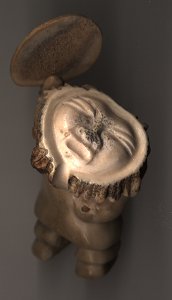
Small Bone Carving
private collection |

In Oktober 2000, the Hamburg Ethnographic Museum organised a day, dedicated to the Shamans from Tuva: Mediators between the Worlds.
Professor Mongusch-Lopsang gave a lecture on Shamanism and Mythologie in Tuva and in the afternoon Saryglar Borbak-Ool, Nikolai Oorschak Munsukowitsch and Nina Syrat Wasiliewna celebrated a ritual
I put together a documentation of this special day.
|
Andreas Lüderwalt published an article on schamans and »magic music«
in the Neuen Zeitschrift für Musik, #3/99. The exhibition Im Banne des Schamanen is the reason. There are no new aspects in this article, but it is a good introduction into this music. We can be happy that there articles like that in music magazines...
Neue Zeitschrift für Musik, Volume 3/99, Page 58/59, Mainz 1999, Germany
|

In September 1992, the Dalai Lama visited Tuva.
There is a book on this event, published by the Krasnojarsk Printing - Kombinat Offset in a circulation of 3000 as well. I took the resume of the visit in english language from this book and I added some of the photos.
I tried to reach the authors to ask for permission to publish this article. I hope they will agree.
© 1992 Vladimir Kara-Sal, Vladimir Sabinx and Roman Tas-Ool |
This musical side-program seems a little off-topic for me, I cannot see a relation to Tuva or the exhibition, but one thing is clear: all these concerts will be worth to assist....
The tuvinian folklore is famous for the small figurines, carved of soft stone. There are very old examples and if you look for a very special one, you must pay a good price. My budget was low, but I am proud that I found some beautiful small pieces.
|
 |
And the most beautiful one, the horse, was a gift.
Beside the horse, the lion, called 'Arslan', is the symbolic animal of Tuva. |
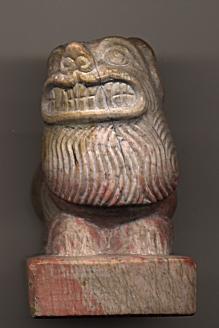
|
All pieces wear a signature on the bottom, which shows the name of the piece, the name of the master and some comments |
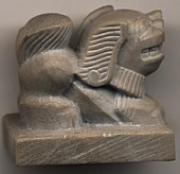
|
Tarbagan Rises on the Earth is the name of an extraordinary CD with Music from Tuva, Mongolia and Japan. I had an email-interview with Todoriki Masahiko which you can read here.
|
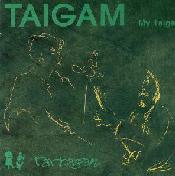 Taigam - my Taiga Taigam - my Taiga
is the new CD by Tarbagan: Todoriki Masahiko and Saga Haruhiko.
Listen to Kozhamyk, a Mongol Waltz
Tuvan Traditional / Mongol Traditional
TODORIKI Masahiko: voice (in Tuvan)
SAGA Haruhiko: Morin Khuur
published by BOOX BOX, Japan
URL: http://www.mmjp.or.jp/booxbox
©1999 BooxBox
|
 Todoriki Masahiko published a very interesting collection of 30 postcards with photos from Tuva, each with a related short essai.: Tuva and Southern Siberia. Todoriki Masahiko published a very interesting collection of 30 postcards with photos from Tuva, each with a related short essai.: Tuva and Southern Siberia.
This publication comes with a small CD with 2 pieces, sung and performed by Todoriki Masahiko himself.
 Todoriki Masahiko: Let me sing Khöömei Todoriki Masahiko: Let me sing Khöömei
He writes: I have been visiting Siberia for nearly ten years. I travel primarily in southern siberia. At first, I travelled around Lake Baikal, then I began traveling to Tuva. Although it is not very well known, the Japanese people are deeply connected to Siberia in various ways. I hope you will enjoy this brief glimpse into the wonders of Siberia.
The postcards are published by Gallery Interform as postcard library #016, Osaka 2000
you can order it at http://www.tuvatrader.com
|
 I present two CDs by Biosintes, the Tuvinian-Armenian trio, at Avantart. So have a look (and listen!): I present two CDs by Biosintes, the Tuvinian-Armenian trio, at Avantart. So have a look (and listen!):
- Biosintes: The First Take at FMP
- Biosintes: Deity at SoLydRecords
|
Huun-Huur-Tu opened their new WebSite, http://www.huunhuurtu.com in May 1999.
Welcome to the Tuvinian Net-Community!
|
Send a musical postcard from Tuva!
 WebCards are 'virtual postcards', which you can send to your friends. You choose a photo, a melody and write some text. Your friend will get a notification to come to this page and read your message, enjoy the photo and listen to the music.
WebCards are 'virtual postcards', which you can send to your friends. You choose a photo, a melody and write some text. Your friend will get a notification to come to this page and read your message, enjoy the photo and listen to the music.
The photos I use for the postcards are photos which I shot during my travel in this beautiful country.
|
Steve Sklar collected a lot of information about Tuva. You can learn about Khomeii at his Khoomei/Overtone Singing Page or browse through his Photo Gallery. It is worth a visit!
Did you know, that Tuva still is in the state of war with Germany? That's true, because Tuva declared war to the German Reich in 1941. As a part of the Soviet Union, it belonged to the winner of the war. But even after the declaration of the independent Republic 1992, there was no time or occasion (or necessity?) to sign a treaty of peace with Germany.
I am happy that it is not necessary to sign diplomatic papers to live in friendship with the people of this country, but
I will suggest peace-talks to our minister of foreign affairs, Joschka Fischer....
How happy could we be if that were the only diplomatic problem in our time! .
I was very annoyed when I read the new volume of the magazine Light in the East, which is published by a german christian missionary society. The publisher sent it to me, proud of their work. In that volume, the Awakening in the Republic of Tuva is one of the main topics.
The work of this society is absolutely aggressive and intolerant.
With unbroken arrogancy, the destroying of the Tuvinian culture by the missionars are praised. Tobias Häßner, the editor writes in his leading article: Alcoholism and drugs are a social problem. That's because many of the Tuvinians are burdened with occultism, not surprising if you look at the many pagan traditions....
And the missionary Alexander Degtjarjow overcomes that in his diary. The arrogancy against one of the oldest traditions of the world comes out clear like seldom:
A young woman testified that all Tuvinians are devoted to schamanism, idols are placed on all heights, the adoration of spirits is the usual practice. Nearly all persons who turn to God, have been close to occultism before. The prayers help them to overcome that in the name of Jesus Christ. The people confess that they were liberated from fear, nightmares, visits of spirits and hallucinations.
Let us hope that this aggressive movement will not find success in Tuva!
|


 I don't want to repeat all this in depth, as there is enough information to be found at the glorious site of the
I don't want to repeat all this in depth, as there is enough information to be found at the glorious site of the 



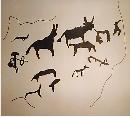



 Taigam - my Taiga
Taigam - my Taiga Todoriki Masahiko published a very interesting collection of 30 postcards with photos from Tuva, each with a related short essai.: Tuva and Southern Siberia.
Todoriki Masahiko published a very interesting collection of 30 postcards with photos from Tuva, each with a related short essai.: Tuva and Southern Siberia. I present two CDs by Biosintes, the Tuvinian-Armenian trio, at Avantart. So have a look (and listen!):
I present two CDs by Biosintes, the Tuvinian-Armenian trio, at Avantart. So have a look (and listen!):  WebCards are 'virtual postcards', which you can send to your friends. You choose a photo, a melody and write some text. Your friend will get a notification to come to this page and read your message, enjoy the photo and listen to the music.
WebCards are 'virtual postcards', which you can send to your friends. You choose a photo, a melody and write some text. Your friend will get a notification to come to this page and read your message, enjoy the photo and listen to the music.